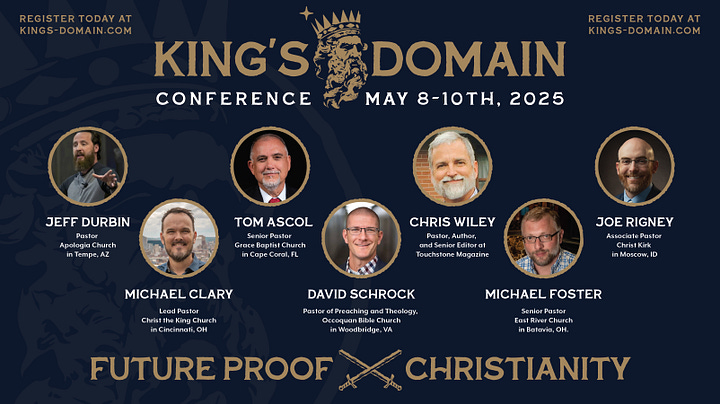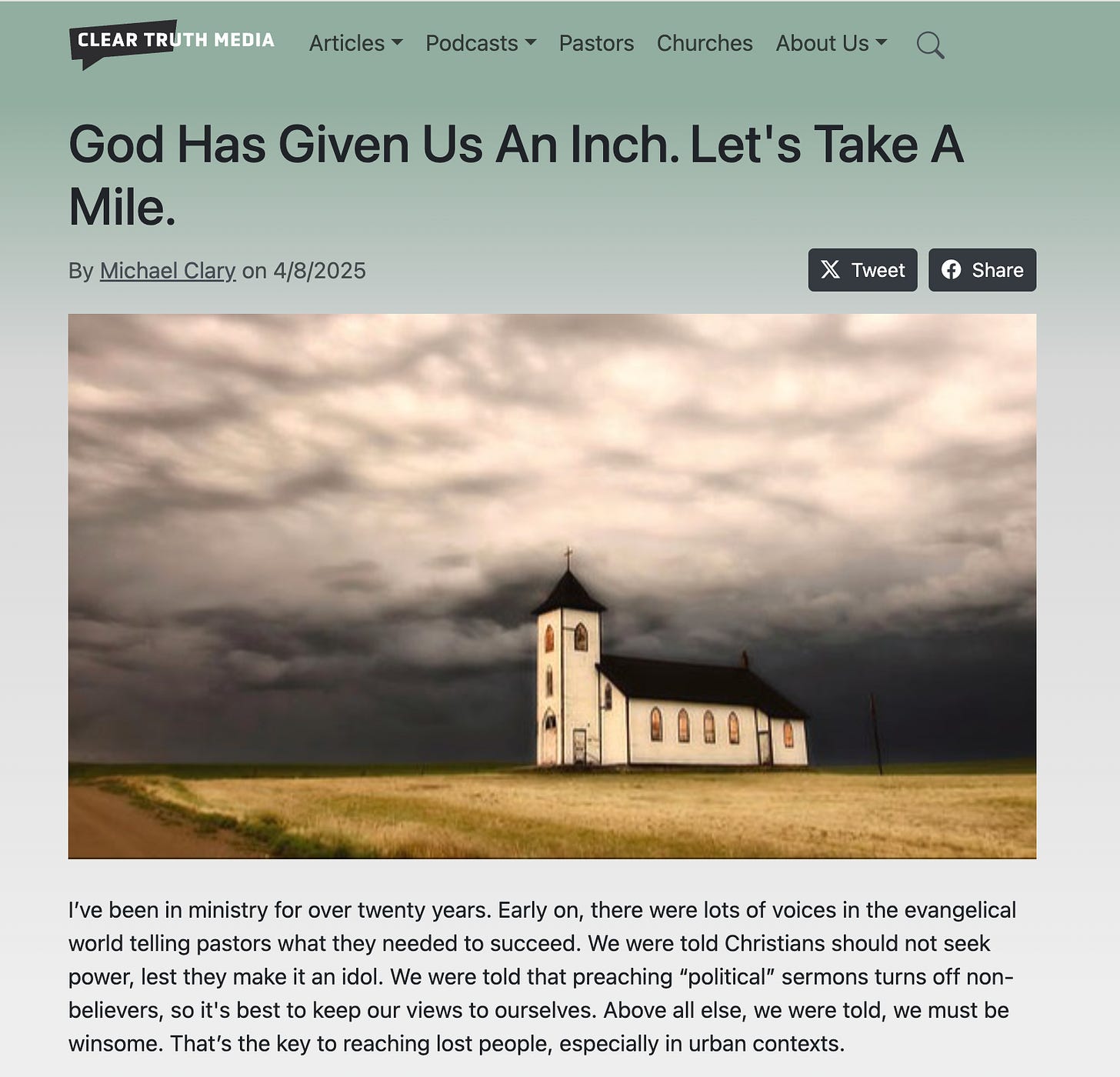God has given us an inch. Let’s take a mile.
Seven Priorities for a Future Proof Christianity
Here’s my latest piece for Clear Truth Media. The last twenty years of Christianity in America were not great. But things are turning around and there’s hope for the future. What priorities do we need to focus on for the next twenty years?
I’ve been in ministry for over twenty years. Early on, there were lots of voices in the evangelical world giving pastors success tips. We were told Christians should not seek power, lest they make it an idol. We were told that preaching “political” sermons turns off non-believers, so it's best to keep your views to ourselves. Above all else, we were told, we must be winsome. That’s the key to reaching lost people, especially in urban contexts.
And so, the results are in, and it’s not pretty. Over the last twenty years have witnessed devastating cultural and moral decline while the church largely remained silent.
For example, the iPhone was invented 18 years ago, which became a rocket-powered, high def porn-on-demand provider for a generation of children, perverting their minds and corrupting their souls.
The Supreme Court invented gay marriage in 2015, which practically redefined and cheapened the world’s first and most foundational institution. The combination of porn-on-demand plus “gay marriage” accelerated the LGBT revolution, with the “T” (for “transgender”) taking center stage as the sexual battle of our age. Meanwhile, normal marriage rates have been in free fall, with many women, even Christian women, choosing to opt out in favor of singleness and motherlessness. After all, we’ve been warned, marriage and motherhood might be an idol.
A friend of mine recently said, “Evangelicalism has spent decades caring more about adults who aren't in their churches than kids who are.”
The present cultural trends are alarming: (1) Women are increasingly turning away from marriage and motherhood, opting instead for careers, singleness, and elective barrenness. (2) Men who desire marriage and family are having greater difficulty finding a wife who shares these goals. (3) Consequently, the USA is now below replacement rate for childbirths, and falling. (4) Greater numbers of women are reporting unhappiness and a lack of fulfillment in life.
In 2020, the church surrendered its prophetic voice to the state, who shut down pulpits as “non-essential” while strip clubs and casinos remained open. Unsurprisingly, declining church attendance has been replaced with rising apostasy. Some people had the courage to raise the alarm, and were ridiculed for it. They were accused of being divisive and unChristlike.
But it’s not all bad news. The governmental overreach of COVID opened many peoples’ eyes, stirring up a backlash, signalling that many Christians recognize the need for change. With the election of President Trump, God has given us a reprieve.
Vice President Vance recently opened up a public discourse of the ordo amoris (“ordered loves”), a classic doctrine that is vital for any nation’s self understanding. Christians are required to love others, but we are not required to love everyone in the exact same way and to the exact same degree. All Christian love must be oriented to the highest good, according to duties and obligations that flow from our ultimate allegiance to God and what He requires of us. Never in my wildest dreams could I have imagined such discussions of public virtue coming out of Washington, DC.
Optimism is in the air. We no longer have an enemy in the Oval Office, undermining our faith at every turn. Young men in particular are trending more conservative, with some openly exploring the Christian faith.
This is an opportunity to make lasting change to turn our nation back from disaster. The fields are white for the harvest. The church needs to reach them for Christ and disciple them to be godly churchmen and responsible statesmen.
In other words, God has given us an inch. Let’s take a mile.
So now, the question is this: how can we best prepare for the next twenty years? The strategies we heard over the last two decades have failed. Going forward, we need the right priorities and better strategies.
Below, I’ve sketched out a handful of priorities I believe are necessary for a future proof Christianity, the kind of rugged faith that will endure for the next twenty years and beyond.
Seven Priorities for a Future Proof Christianity
1. We need to fear God.
A. W. Tozer once said, “what comes into your mind when you think about God is the most important thing about you.” Since the 1980s, irreverence has become a go-to church marketing tactic for churches to grow. As a result, too many Christians treat God like a domesticated house cat, not the Lion of Judah, depriving people of the wonder and awe of a transcendent God. Ecclesiastes 12:13 says, “The end of the matter; all has been heard. Fear God and keep his commandments, for this is the whole duty of man.” Christians that will thrive over the next twenty years will be those with a healthy reverence for God to anchor them in the chaos of life. Churches that fear God properly will be an oasis for thirsty souls to drink the water of life, not a circus side-show to entertain the goats.
2. We need to acquire and assert righteous power.
Too many believers are “low agency” Christians, who believe it is more righteous to assume a passive, “I’m-just-gonna-trust-God,” posture in the world. Scripture does not limit Christian obedience to merely not doing bad things. Rather, we must be “high agency” Christians—asserting what I call “spirit-filled agency,” stepping out in faith to boldly acquire and assert righteous power in the public square. We cannot shy away from power. We cannot fall for the lie that “the most righteous thing to do with power is to lay it down.” God has all power, and Christianity is a powerful faith. Why would we allow the wicked to take power from us and use it against us?
3. We need to be more discerning.
Discernment is defined as “sound judgment which makes possible the distinguishing of good from evil, and the recognition of God’s right ways for his people.” Some people are naturally gifted with discernment, but anyone can grow in discernment if they dedicate themselves to it. Personally, I’ve asked God for greater discernment across multiple areas of my life, and he has answered that prayer. Hebrews 5:12-14 describes how to grow in discernment. It says, “For though by this time you ought to be teachers, you need someone to teach you again the basic principles of the oracles of God. You need milk, not solid food, for everyone who lives on milk is unskilled in the word of righteousness, since he is a child. But solid food is for the mature, for those who have their powers of discernment trained by constant practice to distinguish good from evil.” Discernment grows through a combination of biblical knowledge, practical wisdom, and spiritual maturity. Conversely, discernment falters when someone doesn’t know the bible very well, doesn’t walk in biblical wisdom, and is spiritually immature.
4. We need to recover household discipleship.
Many Christians who believe the bible’s teaching about manhood, womanhood, and the household still don’t know how to apply it practically. The household is the most fundamental and essential building block of society, and future proof Christians will learn how to live the old ways in a new world. That means fathers, mothers, and productive households. The practical skills of running a well-ordered household will be vital to preserve the faith many generations to come.
5. We need to think long term.
Our microwave society lacks the patience of previous generations to build great things. The Cologne Cathedral in Germany, for example, took 632 years to complete. Church discipleship programs are often designed for instant impact rather than sustained success, leading to mile-wide-inch-deep Christians who lack the rugged faith to withstand trials. Most pastors have a plan for Easter Weekend, but do they have a plan to ensure their great-grandchildren will be faithful believers?
6. We need to steward technology wisely.
Christians of the past have used advances in technology to advance the gospel, but there are game-changing new technologies just over the horizon that will test our theology, ethics, and character like never before. Christians will need biblical conviction, theological clarity, and cultural discernment to determine what we should do with AI, robotics, and transhumanism in the years to come. Any technology that robs us of our humanity should be rejected, regardless of the short-term benefits they promise.
7. We need to build and protect.
God hard-wired creativity and enterprise into the human spirit. Christians have always been builders. Christianity has produced literacy, order, and virtue everywhere it has gone. Not perfectly, of course, but this is what happens when a society becomes more Christian. However, as Roger Scruton once observed, “Good things are easily destroyed, but not easily created.” For example, the Notre Dame cathedral in Paris took 183 years to build but was nearly burned to the ground in only a few hours in 2019. This is a fitting metaphor for the Christian West, which was carefully built over many generations but is being squandered, burned, and destroyed before our eyes. Conservatives are good at building things, but we need to do better to protect what we’ve built.
Conclusion
This list just scratches the surface of the various issues we need to think about in the coming years. My original draft for this essay included nearly 20 items! There’s a lot of work to do, and I’m excited to see so many others eager to jump in, get their hands dirty, and get to work.
What lies before us is the best opportunity to make lasting, positive change in my lifetime. We have the chance to make a real difference for the Kingdom of God that will endure for generations. Or we could squander this opportunity and continue slouching towards Gomorrah.
God has given us an inch. Let’s take a mile. Christians that thrive in the years to come will be more rugged, bold, assertive, and uncompromising. Let’s do this.
Future Proof Christianity Conference
I’d like to invite readers of my website to attend the Future Proof Christianity conference this May 8-10 in Cincinnati, OH. It is designed to unpack these priorities and equip the church for the next twenty years.
Together, we can take that mile.
Here’s five BIG reasons to come.
The speaker lineup is top notch
Network with like-minded believers
Value for the money (only $120)
Two women’s breakouts (Betsy Mendel and Emily Foster)
The singles mixer
Click here for more information and to register.
See you there!


Jeff Durbin Interview
I recently had the chance to interview Jeff Durbin, one of the keynote speakers for the Future Proof Christianity conference, on my podcast. It’s the most personal interview I’ve done before, focusing mostly on his life before Jesus and conversion to Christ. Watch/listen to this episode and be encouraged by this testimony of God’s amazing grace.
Youtube
Spotify
Apple



Important post. Please do a follow up or multiple.
Are there livestream options? Unfortunately, I cannot make it to Cincinnati 😔